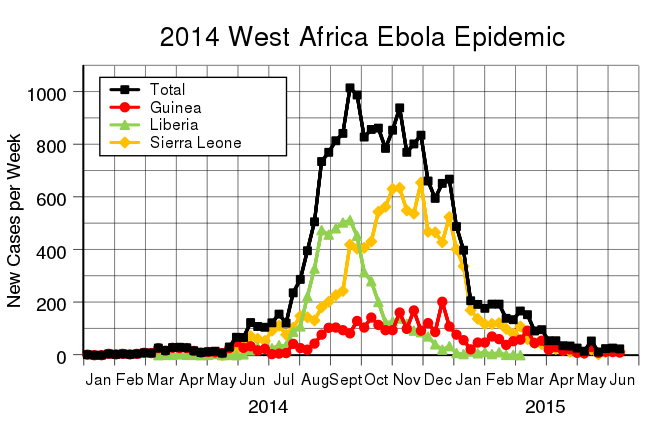
Main Difference
The main difference between Epidemic and Pandemic is that the Epidemic is a rapid spread of infectious disease to a large number of people in a given population within a short period of time and Pandemic is a global epidemic of infectious disease.
-
Epidemic
An epidemic (from Greek ἐπί epi “upon or above” and δῆμος demos “people”) is the rapid spread of infectious disease to a large number of people in a given population within a short period of time, usually two weeks or less. For example, in meningococcal infections, an attack rate in excess of 15 cases per 100,000 people for two consecutive weeks is considered an epidemic.Epidemics of infectious disease are generally caused by several factors including a change in the ecology of the host population (e.g. increased stress or increase in the density of a vector species), a genetic change in the pathogen reservoir or the introduction of an emerging pathogen to a host population (by movement of pathogen or host). Generally, an epidemic occurs when host immunity to either an established pathogen or newly emerging novel pathogen is suddenly reduced below that found in the endemic equilibrium and the transmission threshold is exceeded.An epidemic may be restricted to one location; however, if it spreads to other countries or continents and affects a substantial number of people, it may be termed a pandemic. The declaration of an epidemic usually requires a good understanding of a baseline rate of incidence; epidemics for certain diseases, such as influenza, are defined as reaching some defined increase in incidence above this baseline. A few cases of a very rare disease may be classified as an epidemic, while many cases of a common disease (such as the common cold) would not.
-
Pandemic
A pandemic (from Greek πᾶν pan “all” and δῆμος demos “people”) is an epidemic of disease that has spread across a large region; for instance multiple continents, or even worldwide.
A widespread endemic disease that is stable in terms of how many people are getting sick from it is not a pandemic. Further, flu pandemics generally exclude recurrences of seasonal flu. Throughout history, there have been a number of pandemics, such as smallpox and tuberculosis. One of the most devastating pandemics was the Black Death, which killed over 75 million people in 1350. The most recent pandemics include the HIV pandemic as well as the 1918 and 2009 H1N1 pandemics.
-
Epidemic (noun)
A widespread disease that affects many individuals in a population.
-
Epidemic (noun)
An occurrence of a disease or disorder in a population at a frequency higher than that expected in a given time period.
-
Epidemic (adjective)
Like or having to do with an epidemic; widespread
“Epidemic hysteria occurred upon the incumbent’s reelection.”
-
Pandemic (adjective)
Widespread; general.
-
Pandemic (adjective)
Epidemic over a wide geographical area and affecting a large proportion of the population.
“World War I might have continued indefinitely if not for a pandemic outbreak of influenza.”
-
Pandemic (noun)
A pandemic disease; a disease that hits a wide geographical area and affects a large proportion of the population.
-
Epidemic (noun)
a widespread occurrence of an infectious disease in a community at a particular time
“a flu epidemic”
-
Epidemic (noun)
a sudden, widespread occurrence of an undesirable phenomenon
“an epidemic of violent crime”
-
Epidemic (adjective)
of the nature of an epidemic
“shoplifting has reached epidemic proportions”
-
Pandemic (adjective)
(of a disease) prevalent over a whole country or the world.
-
Pandemic (noun)
an outbreak of a pandemic disease
“the results may have been skewed by an influenza pandemic”
